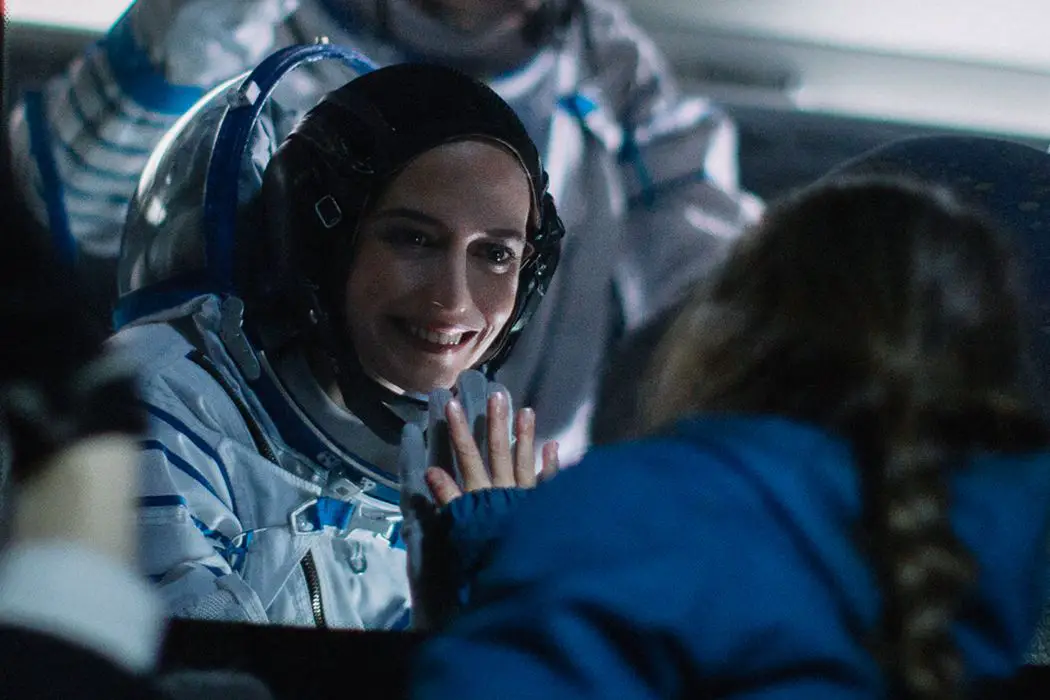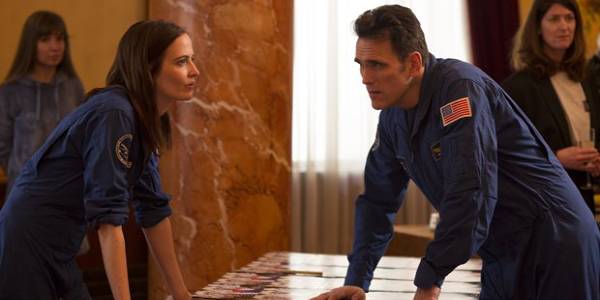Glasgow Film Festival 2020: PROXIMA: A Moving Portrait Of Motherhood

Former film student from Scotland turned writer and film reviewer.
The day has finally come. Up on Glasgow’s Rose Street there is a line of excited bodies stretching halfway down the street itself, almost spilling over onto Sauchiehall Street. There is much noise and a zap of anticipating firing through the air. Up ahead of the line there is a red carpet, bordered off and sporting a black canvas behind it with the words Glasgow Film Festival on it. People with cameras crowd around this section, awaiting the arrival of guests of honour – from actors to directors to writers; a who’s who of British screen talent, here to celebrate one of Britain’s leading film festivals.
The Glasgow Film Festival began in 2005 with just 6,000 attendees and has worked its up way to over 42,000 attendees in 2017. The festival goes from strength to strength, showcasing many underground classics and innovating features and some of the best films from around the world using its festival strands to highlight these.
Tonight is a first: the opening film of the Festival itself is Proxima; directed by Alice Winocour. It is the first time in the Festival’s history that a film by a female director has been chosen for the opening night. Winocour herself will be in attendance, taking questions after the feature.
After the line has gone down, the tickets handed out, and the obligatory gift bags handed out, everyone takes their seats. Again, the atmosphere is palpable. For many in Scotland’s biggest city, this is one of the most anticipated nights on the calendar. It’s clear to see: not a single seat is left unreserved. The theatre is packed wall to wall with excited cinemagoers.
In fact, the Glasgow Film Theatre – the host of the Film Festival itself – is showing Proxima on all three of its screens this evening, such was the demand for this event. Winocour comes out to introduce the movie (“this is not a space movie, this is an Earth movie”) and promises to be back afterwards for a Q&A. Without further ado, the lights dim, the screen lights up, and the Film Festival is underway.
No Such Thing As The Perfect Mother
Sarah Loreau (Eva Green) has spent her whole life wanting to be an astronaut. When she was eight years old she placed a lampshade over her head and pretended to be setting off into space. Thirty years later she gets her wish: she is chosen to join a year long mission to the International Space Station as it prepares a launch to Mars. Sarah has trained her whole life for this, and nothing will get in her way; but, as the brutal training begins and Sarah finds herself contending with both a misogynistic colleague (Mike Shannon, played by Matt Dillon) and a young daughter whom she must separate from, Sarah will find her life’s dream is a lot harder to achieve than she ever thought it could be.
Proxima, at its heart, is a movie about motherhood. Sarah is a good mother; she is gentle and attentive to her daughter Stella and they share a close bond. Proxima doesn’t place any judgements on Sarah for her decisions to leave her daughter (in the Q&A later, an audience member will ask Winocour if being an astronaut is selfish, and Winocour will respond that she does not know, and it seems her film isn’t necessarily interested in answering that question in any case), instead focusing on Sarah’s attempts to balance her relationship with her daughter at a crucial time in her life with the rigorous, all-encompassing demands of her training schedule.
At one point Sarah is told that her daughter may potentially have her first boyfriend, and it’s clear to see the heartbreak in Sarah’s eyes that her daughter did not tell her this herself, or that she couldn’t be there to be a part of this important moment in Stella’s life. It is played wonderfully by Eva Green, who clearly relishes this role of an otherwordly mother trying to contend with the conventional tropes of parenthood (“I’m becoming a space person” she writes to her daughter at one point, regarding the changes her body will make once they leave the earth’s atmosphere).

Sarah must place her daughter in the care of both an assigned carer, who’s job is seemingly to ensure the psychological welfare of both mother and daughter, and her ex-husband – played as exasperated and put upon by Lars Eidinger. Throughout we see montages of Sarah explaining the training process to her daughter via video messages and letters home, and this is really the bulk of the movie; Sarah wants her daughter to be a part of this process as much as possible, but Stella struggles with the distance and being unable to communicate the basic day-to-day life experiences she has (the aforementioned boyfriend, the time she falls off her bike and breaks her arm, her struggles to keep up with her maths homework).
Proxima acts almost like a tone poem throughout most of this. We see much of Sarah’s training, including underwater sequences where she must “rescue” her unconscious colleagues, and many of the workout schedules she has. At times much of this is wordless, with the film choosing to focus instead on beautiful shots of the minutiae of preparing for life in space. At one point Sarah goes into the woods with fellow astronaut Anton (Aleksey Fateev) who wants to record the sounds of the forest and the river because those sounds are the things he misses when he’s in space. It’s a fascinating insight into aspects of space travel that might not occur to those who will never leave Earth; as Winocour will later tell her audience, many of these small aspects were garnered from her conversations with actual astronauts in preparation for filming, including the recordings of nature.
Alongside this is the typical PR stunts one would assume must be commonplace for astronauts about to leave Earth. Sarah must pose for pictures, do interviews in her spacesuit, and attend parties and events to celebrate the mission. She does these with a wistfulness that you read as conflict; for all she has wanted this her whole life, the reality of it and what it will entail places a great pressure on Sarah as launch day approaches and she must accept she will not see her daughter for an entire year.
“There’s no such thing as the perfect astronaut, just like there’s no such thing as the perfect mother” Sarah is told at one point. If anything could sum up the core message of Proxima, it is this. Despite Sarah’s attempts to be both things at once, she finds more and more throughout the movie, that what she is attempting is impossible, and that that is okay.
A Woman in a Man’s World
Winocour mentions during the Q&A that astronaut suits were designed for men. “Men’s power is in their shoulders”, she says, “while women’s power is in their hips”. Suits were designed to place emphasis on a man’s physique, in that case, not a woman’s.

This is another interesting aspect of Proxima. Sarah is a woman in a male’s world and has to contend with this constantly. The prime antagonist for this is arrogant American astronaut Mike Shannon. From the moment Shannon introduces Sarah at the launch party, it’s clear what he thinks of her. “It’s good to have a French woman on board”, he says “I hear they’re good cooks”. Sarah, initially offended by this remark, brushes it off. Later Shannon begins to tell her what he thinks of her and she cuts him off. “You didn’t need to, you were thinking it pretty loudly”.
There are interesting aspects of this which Winocour doesn’t necessarily tackle, such as the implication of what might happen when Sarah goes off into space and must spend an entire year in close confines with only two other men. Surely sexual tension must be a factor and training needed to ensure professionalism can endure such moments? If so, we never see this. The closest concession we get is a scene where Green shares a changing room with Shannon and is casually topless in front of him. You get the implication that this is designed to ensure there is no sexual tension between them when they go to the ISS. Indeed, there is never any hint of romance between Sarah or either of her colleagues. The only love story Proxima is concerned with is the love between mother and daughter.
Lights Up
Winocour takes the stage shortly after the lights come up and discusses her reasons for making Proxima. She has a daughter, she explains, the same age as Stella. She wanted to examine the bounds of a relationship between a mother and a daughter under extraordinary circumstances. She spent time in both America and Russia investigating procedures which astronauts undertake before they are mission ready and incorporated much of this into the movie. As far as she in concerned, however, Proxima is not a space movie. By and large it is a love story with space exploration as a backdrop.

At Glasgow’s reknowned 29 bar in Royal Exchange Square the after-party is well under way. Champagne and canapes are served as dozens and dozens of cinemagoers mill about, discussing the movie and their expectations for the weeks of the Festival ahead. This is a night of revelry, and as Winocour enters the bar and mingles with the guests, taking pictures and signing autographs, it is hard not to feel like the opening night was a success.
Proxima: Conclusion
Proxima was the first female-centered movie to open the Glasgow Film Festival and the organisers chose an excellent one to showcase female talent. The film itself is not just a female-directed movie, but a female led one, focusing on the hardship of motherhood, the difficulty of balancing that with a career, and the added difficulty of being a woman in an industry dominated by men. It celebrates women in the best way and is sure to be talked about as an excellent choice to open the 2020 Glasgow Film Festival.
With beautiful direction and cinematography, a haunting score, and excellent acting by Eva Green in particular, Proxima is a solemn, slow meditation on motherhood and the bond between mother and daughter. Its slow pace may deter some, and there’s a particular denouement which might be a step too far for some viewers, but if you’re interested in a very grounded human drama, you could do much worse than this space movie.
What did you think of Proxima’s exploration of the relationship between mother and daughter? Let us know in the comments below!
Proxima will be released in the UK on 17th April. For all relate dates please click here.
Does content like this matter to you?
Become a Member and support film journalism. Unlock access to all of Film Inquiry`s great articles. Join a community of like-minded readers who are passionate about cinema - get access to our private members Network, give back to independent filmmakers, and more.













